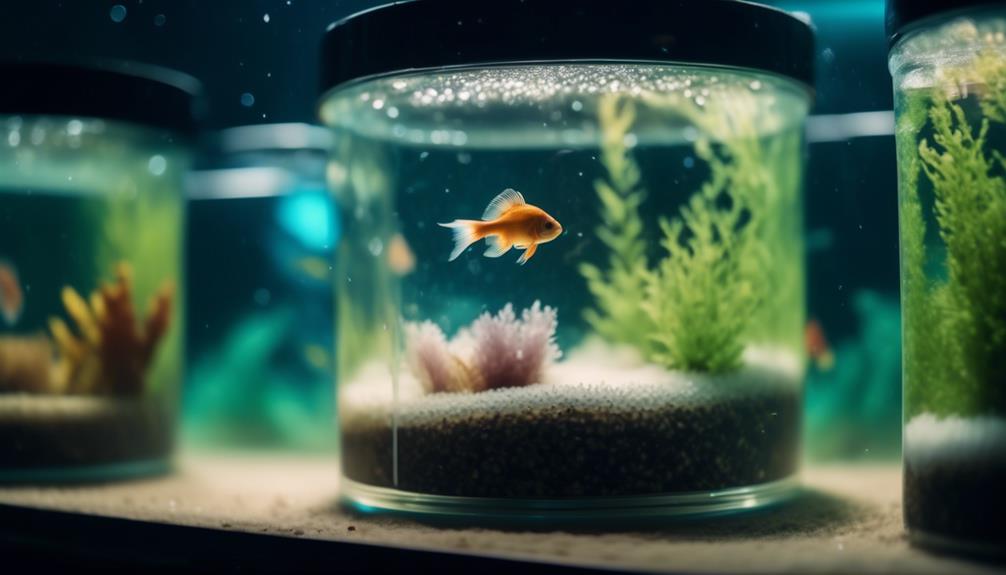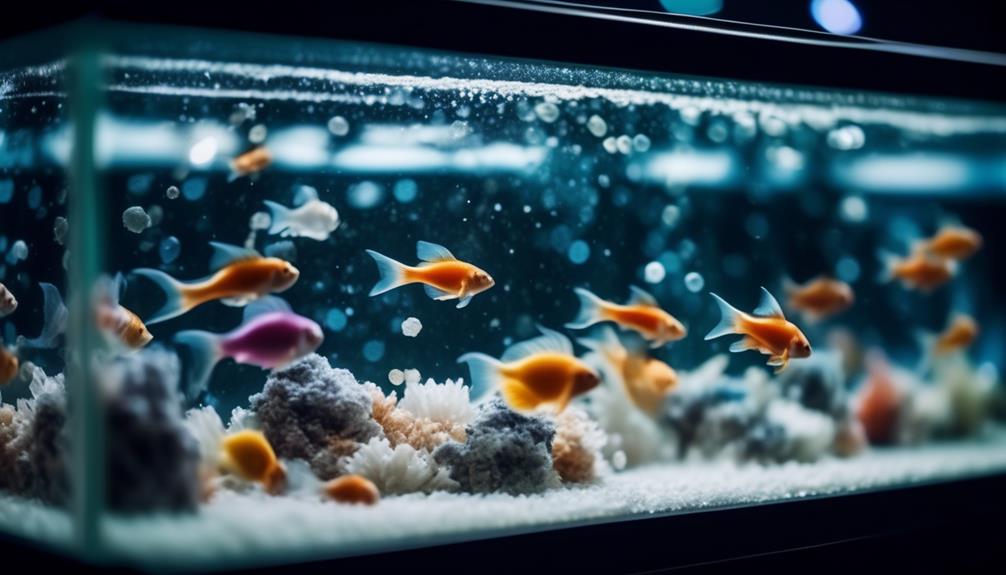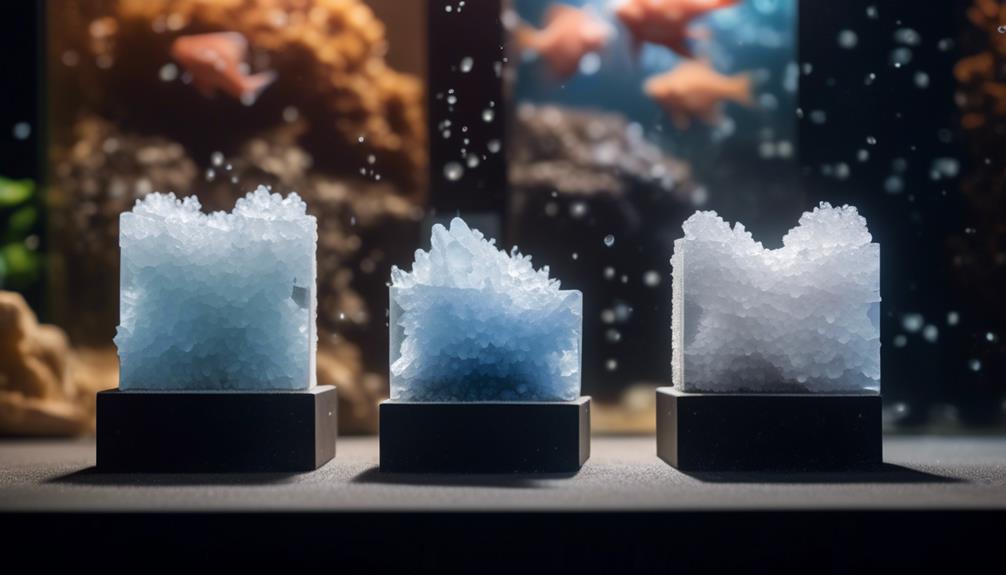Long ago, people wouldn’t even think about changing the salt in a fish tank, or use a phone to check the water.
Yet, here I am in the modern era, and people wonder if they should use Epsom, aquarium, or table salt for their fish tanks.
I am dealing many years fish tanks and understand that different kinds of salt do different things.
I’ll explain how these salts are different and how using the wrong one can cause problems for the fish.
Some salts can make fish feel better, some can keep them from getting sick, and some people don’t think you should use regular salt at all.
Mike’s Thoughts

Epsom salt is hailed for its healing properties, particularly in treating fish with ailments.
Aquarium salt is a tried-and-true option for fending off disease and promoting fish health.
Table salt, while controversial, can sometimes be used under specific circumstances.
However, careful consideration and knowledge are paramount when adjusting the saline environment of your fishy friends.
I’ve put a bunch more detail below that expands on the topic, so feel free to read on and leave a comment if you have any questions or reach me on Facebook.
Understanding Aquarium Salt
Aquarium salt’s unique composition makes it an essential tool for fostering healthy water conditions and supporting the wellbeing of freshwater fish.
Unlike table salt, which is refined and often iodized, aquarium salt is unrefined and rich in minerals, making it far more beneficial. It’s not just about salinity; it’s about the health perks these minerals offer.
When I compare aquarium salt vs table salt, what stands out is the absence of added iodine and anti-caking agents in aquarium salt, which can be harmful to my fish.
Moreover, the benefits of using epsom salt, particularly as a remedy for swelling and constipation, complement the use of aquarium salt, as both address different needs within the tank, contributing to a balanced and healthy aquatic environment.
Benefits of Aquarium Salt
Harnessing the power of mineral-rich aquarium salt offers numerous health advantages for freshwater fish, from bolstering their immune systems to helping maintain a stable, electrolyte-rich environment.
Unlike table salt, aquarium salt is tailored for aquatic life, ensuring a more natural habitat for my finned friends.
Here’s why I’m a fan:
- Stress Reduction: It soothes fish during stressful times, like illness or tank changes.
- Disease Prevention: Helps fend off common ailments, giving them a fighting chance.
- Electrolyte Balance: Maintains vital functions by replenishing essential electrolytes.
- Healing Aid: Speeds up recovery from wounds, unlike table salt which lacks therapeutic properties.
While the benefits of epsom salt are notable, especially for specific conditions, aquarium salt is my go-to for overall fish health and tank maintenance.
Precautions With Aquarium Salt
While aquarium salt offers several benefits, it’s crucial to use it judiciously to avoid potential harm to your aquatic pets and plants. I always make sure to consider the species of fish and plants in my tank before adding any salt. Unlike the potential risks of using table salt, which can have additives harmful to fish, aquarium salt is safer but still requires care.
| Precautions | Reason | Impact |
|---|---|---|
| Monitor Dosage | Prevent toxicity | Ensures fish safety |
| Know Species Sensitivity | Some fish/plants are salt-intolerant | Prevents harm to inhabitants |
| Acclimate Gradually | Sudden changes stress fish | Reduces risk of shock |
| Avoid for Sensitive Plants/Fish | Not all flora/fauna can tolerate | Preserves ecosystem balance |
Taking these precautions when using aquarium salt helps maintain a healthy, thriving aquarium community.
When Should You Avoid Aquarium Salt?
Avoid in this 5 situations:
I should not add salt to my fish tank if the water is already good. If I put extra salt, it might mess up the water’s balance.
I must not put salt if I have very sensitive fish. Some fish don’t like too much salt and can get sick.
Before using salt for sick fish or bugs in the tank, I need to talk to a vet. This is very important for big problems like bad infections or lots of parasites.
Salt alone is not enough for treating fish illnesses or parasites. It works better with other medicines, like antibiotics.
And I should not use salt instead of changing the water. Even with salt, I need to keep changing the water to keep my tank clean and my fish healthy.
Epsom Salt Explained
Having addressed the careful use of aquarium salt, let’s now focus on Epsom salt, a different type of salt that serves specific purposes in a freshwater aquarium setting.
Epsom salt, or magnesium sulfate, isn’t your regular table or aquarium salt. It’s particularly effective in treating certain fish ailments, and its benefits shouldn’t be overlooked. Here’s why:
- Epsom salt vs Aquarium Salt: Epsom salt is used for health treatments, whereas aquarium salt is beneficial for general tank health.
- Relieves Swelling: It treats dropsy by reducing fluid retention.
- Aids in Digestion: Helps fish with constipation, making them more comfortable.
- Improves Buoyancy Issues: Addresses swim bladder problems, which can be vital for a fish’s survival.
The benefits of Epsom salt in a fish tank are clear, and understanding its proper use is key to a healthy aquarium.
Treating With Epsom Salt

When treating ailments like dropsy or constipation in fish, Epsom salt can be a highly effective remedy.
I’ve found that Epsom salt for fish health is particularly useful due to its magnesium sulfate content, which helps to reduce swelling and promote bowel movements.
Unlike table salt, which should be used sparingly due to its potentially harsh effects on certain fish and plants, Epsom salt is generally safer and more therapeutic in a fish tank environment.
I always make sure to dissolve the Epsom salt in a separate container before adding it to the tank to prevent any sudden changes in the water chemistry.
It’s a go-to solution that I rely on for maintaining my fish’s health without the risks associated with using table salt.
When to Avoid Epsom Salt
Despite the benefits of Epsom salt for treating certain fish ailments, it’s crucial to recognize situations where its use may do more harm than good. Here’s when I steer clear:
- Using Epsom Salt for Plants: Avoid if your tank contains plant life; Epsom salt can disrupt their growth and even be lethal.
- Sensitive Fish: Some species are particularly sensitive to magnesium sulfate, so it’s better to consult an expert before use.
- Effects of Salt on Freshwater Snails: Epsom salt can be detrimental to these creatures, potentially leading to fatal outcomes.
- Unnecessary Treatment: If your fish are healthy and water parameters are optimal, adding Epsom salt can upset the balance and cause stress or harm.
Table Salt in Aquariums

While aquarium salt is specifically designed for fish tanks, regular table salt can also be utilized in certain situations to manage aquarium health and fish well-being. I’ve found that table salt concentration must be monitored carefully; too much can harm the delicate balance of your aquarium, especially impacting the effects on aquarium plants.
Here’s a quick comparison to help you understand the differences:
| Aspect | Aquarium Salt | Table Salt |
|---|---|---|
| Composition | No additives | Often iodized |
| Impact on Plants | Generally safe | Can be harmful |
| Recommended Use | Health & treatment | Limited circumstances |
When Does Table Salt Helps?
If you like taking care of fish and want to keep your aquarium healthy, you need to know that table salt is really useful. Let me tell you the main things salt does in your fish tank.
Nitrite Poisoning
If nitrites get too high in your water, it’s bad for your fish. Salt helps lower nitrites and gives fish important stuff they need to stay well.
Be careful not to use more than one tablespoon of salt for every five gallons of water. Before you add salt, change some of the water a few times to make things better. Sometimes, salt can also stop too much algae from growing.
pH Balance
You can use salt to change the pH in your aquarium, but you have to be careful. Different fish need different pH levels, so check what’s right before you change anything.
Add a little salt at a time and don’t use too much. Always mix the salt with water in another container before putting it in your tank so you don’t shock your fish with a big pH change.
Disease Prevention
Salt is great for stopping diseases in your fish tank. It makes life tough for bad germs and bugs and keeps the water clean, all while helping your fish stay healthy.
Just remember, too much salt isn’t good, so always follow the right amount and only use salt when you really need to.
Safe Use of Table Salt
Using table salt in an aquarium requires precise dosing to avoid harming fish and plants. It’s crucial to understand both the benefits and potential dangers of table salt before incorporating it into your tank. Here’s a concise guide to ensure you’re using it safely:
- Dose Carefully: Never add table salt directly to the aquarium. Dissolve the correct amount in a separate container first.
- Monitor Plants: Be wary of using table salt with live plants, as it can be detrimental to their health.
- Observe Fish: Watch your fish for any signs of distress after adding salt.
- Avoid Overuse: Excessive salt can lead to dehydration and other health issues, so stick to recommended dosages.
Stay informed and your aquarium will thrive!
When Should You Avoid Using Them?
Salt can be added to freshwater aquariums, but there are some circumstances in which it should be avoided.
The Most Important Factor Is the Species of Fish You Keep
- Not all fish species tolerate salt well, so if you have fish that cannot tolerate salt, then adding any amount of salt could cause major issues for them.
- Some aquatic plants may suffer from too much exposure to salt, so it is best to research the species of the plant before adding any salt.
- Fry can be delicate and may not tolerate changes in their environment as well as other fish. Therefore, it is best to avoid using salt when raising fry until they have grown and developed enough to withstand the addition of salt.
Table salt can be a great benefit to freshwater aquariums when used properly, but if it is not used with caution and care, then it could potentially cause harm to your fish or plants.
No products found.
Comparing Salt Types
When comparing the different types of salt for aquarium use, it’s crucial to understand their specific benefits and potential drawbacks. Table salt vs. aquarium salt is a common debate among aquarists.
Table salt is readily available and can help in treating illnesses, but it lacks the beneficial minerals found in aquarium salt. On the other hand, aquarium salt offers trace elements that support fish health and water quality, which table salt can’t match.
When using salt for water parameter adjustments, it’s all about the dos and don’ts. You mustn’t overdo it—excess salt can harm plants and sensitive fish. Always start with lower dosages and observe your aquarium’s response.
Frequently Asked Questions
Can I Use a Combination of Different Salts in My Freshwater Aquarium?
I wouldn’t recommend mixing different salts in my aquarium without a clear reason.
If I must, I’d follow specific salt proportions and mixing instructions closely, considering each salt’s impact on my fish.
I’d start with aquarium salt for general health, using Epsom sparingly for specific issues like bloating.
I would avoid table salt due to potential additives.
It’s crucial to research and understand my aquarium’s needs before altering its delicate balance.
How Does the Use of Salt in a Freshwater Aquarium Affect the Filtration System?
I’ve found that using salt in my freshwater aquarium doesn’t harm the filtration system, provided it’s salt-tolerant.
However, I do need to check and clean my filters more often—increasing maintenance frequency—since salt can cause mineral buildup.
It’s crucial to ensure the filter is compatible with saltwater use, even in freshwater tanks, to prevent any potential issues and keep my aquatic environment healthy and thriving.
Marine Salt or Aquarium Salt?
There is a difference between aquarium salt and marine salt. You shouldn’t use marine salt in freshwater tanks because it has special chemicals. You should use aquarium salt for freshwater fish tanks.
Aquarium Salt or Kosher Salt?
Aquarium salt is special salt for fish tanks. It cleans well because it has lots of sodium and chloride.
Kosher salt is different; it’s mainly potassium and doesn’t clean as well. It’s not the best choice for fish tanks, but it can work if needed.
Are There Any Natural Alternatives to Using Salt in Freshwater Aquariums?
Yes, I’ve explored natural additives as alternatives to salt in my freshwater aquarium.
Plant-based treatments like catappa leaves or peat moss can replicate some benefits of salt, such as enhancing water quality and offering antibacterial properties.
They don’t carry the over-salination risk and are safe for my sensitive species.
I’ve found them particularly useful for mimicking natural environments, which can be better for the overall health of my aquarium inhabitants.
Can Salt Be Used in a Hospital or Quarantine Tank Differently?
I’d use salt differently in a quarantine tank than in my main setup. Carefully measuring the salt dosage is crucial to avoid stressing sick fish further.
For quarantine duration, consistent monitoring is key. I aim for optimal healing without disrupting the tank’s balance.
It’s a delicate process, but following best practices ensures the wellbeing of my aquatic friends while they recover from illness or acclimate to their new environment.
Which Is Best For an Optimal Freshwater Aquarium?
You should use aquarium salt for your freshwater tank. This salt has special stuff inside that keeps your fish home nice and healthy.
It makes your fish feel less worried, cleans the water, gives energy, and stops bad germs from spreading.
Don’t use cooking salt or bath salt; they’re not good for your fish friends. The good things in aquarium salt are just what your fish need to be happy and healthy in their water home.
How Do Water Temperature and Ph Levels Interact With the Different Salts?
I’m careful with salt in my aquarium, considering how pH levels and water temperature can affect fish health. Warmer water can increase salt toxicity, so I adjust amounts accordingly.
I also monitor pH stability because different salts can alter it. I make sure any changes are gradual to prevent shocking my fish.
It’s a delicate balance, but it’s crucial for their well-being.
